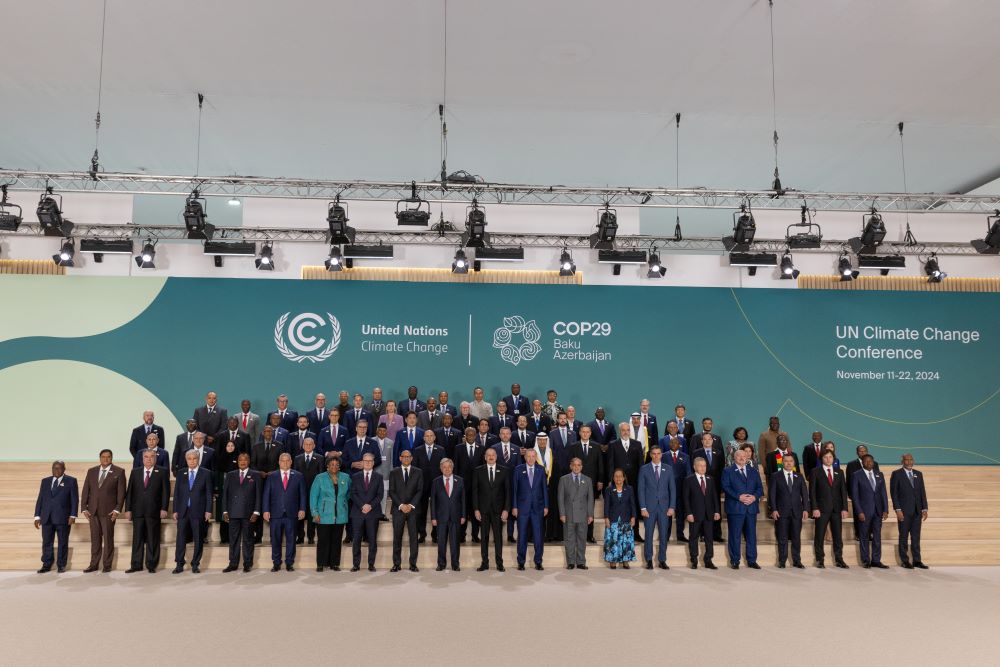Rescuers work at Okhmatdyt Children's Hospital in Kyiv, Ukraine's capital, July 8, after it was severely damaged during Russian missile strikes. At least 31 were killed and over 135 injured as Russian bombers pummeled Kyiv and other Ukrainian cities that day with more than 40 missiles and guided aerial bombs. (OSV News/Reuters/Oleksandr Ratushniakters)
Debate about how much money countries should direct toward addressing climate change has overlooked the massive spending on weapons and wars, say faith activists here at the United Nations climate conference.
The summit in Baku, known as COP29, has centered on climate finance. Nearly 200 countries are expected to secure a deal to increase funding to developing countries to transition to clean energy and adapt to and recover from climate impacts. Nations most vulnerable to a heating world have called for $1.3 trillion annually by 2035 from developed nations, banks and the private sector.
Faith leaders and activists argue that wealthy and developed countries, which are responsible for more than half of all historical carbon dioxide emissions, possess sufficient economic resources to meet the challenge posed by climate change, but they're often directed toward financing wars and subsidizing the fossil fuel industry.
"Many governments prioritize military expenditures over addressing the climate crisis, despite the fact that war often exacerbates both humanitarian and environmental destruction," said Fr. Iyan Daquin Iyo of the OMI Kenyan Mission and part of the VIVAT International delegation.
Fr. Iyan Daquin Iyo from the OMI Kenyan Mission is at COP29 as part of VIVAT International's delegation. (NCR photo/Doreen Ajiambo)
Global military spending reached $2.44 trillion in 2023, the ninth consecutive year military expenditures hit an all-time high, according to the Stockholm International Peace Research Institute. Fueling the rise has been the outbreak of the Russia-Ukraine war in 2022, the ongoing conflict between Israel and Hamas and escalating tensions in the South China Sea. Conflicts are also raging in Congo and Sudan.
The United States allocated $916 billion for defense in fiscal year 2023. Long the global leader in military spending, the U.S. in 2023 accounted for 40% of global defense expenditures, or more than the next nine countries combined. China ranked second in military spending in 2023, at $296 billion, followed by Russia with $109 billion.
In military spending as a percentage of gross domestic product, the U.S. (3.4%) ranked lower than Saudi Arabia (7.1%), Israel (5.3%), Algeria (8.2%) and Russia (5.9%).
'The process of extracting new pledges from wealthy countries has been similar to pulling a tooth out without anesthesia.'
—Fletcher Harper
As military spending has climbed, so too have global temperatures. The last 10 years have been the 10 hottest since recordkeeping began in the late 1800s, and 2024 is tracking to be the hottest yet.
The planet is currently on pace to surpass the 1.5 C temperature limit under the Paris Agreement sometime in the 2030s, and to heat between 2.6 C and 3.1 C by the end of the century. That will result in "debilitating impacts to people, planet and economies," according to the latest U.N. emissions gap report.
To keep the 1.5 C goal within reach, scientists say countries must slash global greenhouse gas emissions nearly in half by 2030. Under current climate plans, emissions are set to decline approximately 2.6% by that time.
The ability of wealthy nations to allocate vast resources to defense and wars — such as the Israel-Hamas war and the conflict in Lebanon — while neglecting long-promised commitments to address climate change was hypocritical, said faith activists in Baku.
"People are dying in Gaza and around the world due to the weapons purchased by leaders who claim to be saving the world," said Nusrah Mohammed, a religious and climate activist from Palestine representing Muslim youth. "If they genuinely want to help, they should stop funding genocide and redirect that money toward climate initiatives."
Antonio Yayrator Korkuvi, a policy officer at the International Federation of Catholic Parochial Youth Movements, agreed that wars divert not just resources but attention from global crises like climate change. Behind the conflicts are often leaders and groups who prioritize power, control and ideological goals over humanitarian and environmental concerns, he told EarthBeat.
"The resources spent on weaponry, military campaigns and reconstruction after conflicts could be redirected to address climate change, which is a common threat to all nations," Korkuvi said.
Climate activists, including religious leaders, demonstrated at the COP29 U.N. climate summit in Baku, Azerbaijan, Nov. 15. They are calling for developed countries to halt war funding and instead direct those funds toward climate action. (NCR photo/Doreen Ajiambo)
Along with defense, governments have devoted significant spending on subsidies for coal, oil and gas — the primary sources of heat-trapping greenhouse gas emissions driving climate change. According to the International Energy Agency, global spending on fossil fuel subsidies reached $620 billion in 2023, down from the peak of $1 trillion in 2022 but far outpacing the $70 billion spent on clean energy investments.
Other analyses looking at indirect costs of fossil fuel subsidies placed the 2022 figure at $7 trillion, which would represent 7.1% of global GDP.
The combined trillions spent on defense and fossil fuels stands in contrast to the funding so far directed to developing countries to assist in reducing their own heat-trapping greenhouse gas emissions, faith leaders say.
The prior global finance target of $100 billion annually by 2020 was reached two years late, and some countries and watchdog groups have questioned whether it has actually been achieved. The Loss and Damage Fund, launched at COP28 in Dubai, so far has received pledges totaling $770 million, with contributions from the U.S., United Kingdom, Germany, Japan and United Arab Emirates. Some analyses estimate climate-related damages will reach $580 billion by 2030.
At COP28, nations for the first time committed to a transition from fossil fuels, but did not specify a timeline.
Fletcher Harper is an Episcopal priest and executive director of Green Faith. (NCR photo/Doreen Ajiambo)
"Within wealthy countries there has not been enough cultural and political pressure to make good on these pledges, and the process of extracting new pledges from wealthy countries has been similar to pulling a tooth out without anesthesia," said Fletcher Harper, an Episcopal priest and executive director of GreenFaith.
"They resist incredibly hard," he told EarthBeat. "They provide loans instead of grants. They double count prior commitments. It's really embarrassing and it is shameful."
Korkuvi said that developed nations' repeated neglect of their financial obligations has created "a growing sense of frustration and urgency" among countries most vulnerable to climate change who are in desperate need of support.
"It is evident that honesty, transparency and accountability in quality climate finance are critical to rebuilding trust," he said.
Advertisement
Absence at COP29 of leaders from many top-emitting countries has also raised concerns about their commitment to addressing climate change, faith groups said.
Heads of state of many G20 countries opted to head to Brazil rather than Baku, among them U.S. President Joe Biden, Chinese President Xi Jinping, Indian Prime Minister Narendra Modi, German Chancellor Olaf Scholz and Brazilian President Lula da Silva.
In their final communique, G20 leaders offered support for COP29, reiterated support for the 1.5 C limit and pledged to "accelerate the reform of the international financial architecture so that it can meet the urgent challenge of sustainable development, climate change and efforts to eradicate poverty."
"Our leaders lack seriousness in addressing climate change; they only react swiftly to funding wars worldwide," said Michele Talawa, a Brazilian religious and climate activist at COP29.
"Look at the wars that are taking place; these are fully funded conflicts," she added. "That money is needed elsewhere for people affected by the severe impacts of climate change."

Heads of state attend the opening ceremony Nov. 12 of the world leaders summit at the COP29 United Nations climate change conference, in Baku, Azerbaijan. (UN Climate Change/Kiara Worth)
Iyo, the Kenyan priest, said redirecting funds from military spending and environmentally destructive industries toward clean energy and sustainable development would be a critical step by governments and corporations to be accountable for their contributions to climate change.
Success at COP29, faith activists said, hinges on how effectively countries can mobilize financial resources, turn promises into concrete actions and foster global cooperation in the face of geopolitical tensions. Whatever the outcomes, they'll hold significant implications for the parts of the world that bear the brunt of the climate crisis.
"Negotiations need to focus not just on emissions," Iyo said, "but on the broader system of governance and wealth inequality that perpetuates climate inaction."






